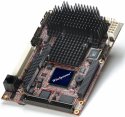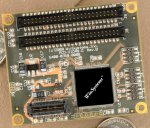EPIC SBC runs hot and cold
Nov 14, 2008 — by Eric Brown — from the LinuxDevices Archive — 2 views WinSystems announced an EPIC-format, extended-temperature single board computer (SBC) that runs Linux. Aimed at industrial applications, the EPX-855-G is equipped with an Intel Celeron-M clocked at 1GHz (fanless) or 1.8GHz Pentium (fan), and can operate at temperatures ranging from -40 to 158 degrees F.
WinSystems announced an EPIC-format, extended-temperature single board computer (SBC) that runs Linux. Aimed at industrial applications, the EPX-855-G is equipped with an Intel Celeron-M clocked at 1GHz (fanless) or 1.8GHz Pentium (fan), and can operate at temperatures ranging from -40 to 158 degrees F.
(Click for larger view of the EPX-855-G)
The EPX-855-G is designed for the management of geographically distributed industrial machinery and sensors, says WinSystems. Specific applications are said to include robotics, COTS military systems, transportation, pipelines, and machine control. Previous WinSystems SBCs to offer extreme temperature support include the Celeron-based EBC-855-G, an EBX-format board that shipped in 2006. Previous EPIC-format SBCs included the circa-2005, AMD GX500-based EPX-GX.
The EPX-855-G is equipped with an Intel 1GHz Celeron-M, upgradable to an Intel 1.8GHz Pentium MTM (which requires a fan). The SBC also uses Intel's 855GME chipset with the ICH4 communications controller and integrated Extreme Graphics 2 video 3D controller, and offers a CompactFlash socket, and an Ultra-ATA storage interface.
Connectivity features include one port each for gigabit Ethernet and 10/100 Ethernet, four USB 2.0 ports, and four COM channels. A miniPCI-connected WiFi module can be swapped out for a cellular modem or ZigBee radio, says the company. Additional I/O includes 24 lines of software programmable digital I/O with event sense and interrupt support on each. The EPX-855-G is said to provide for SVGA and dual-channel LVDS video.
Specifications for the EPX-855-G are said to include:
- Processor — Intel 1GHz ZCDTM, upgradable to Intel 1.8GHz Pentium MTM
- Chipset — Intel 855GME with ICH4 controller and Extreme Graphics 2 video 3D controller
- Memory — up to 1GB of 200-pin SODIMM PC2700 DDR SDRAM (socketed)
- Flash expansion — CompactFlash I/II slot
- Display — supports up to 2048×1536 resolution; dual-channel LVDS video
- Audio — AC97 Audio (six channels, 5.1 surround sound)
- Expansion — 1 x miniPCI socket; PC/104 and PC/104-Plus connectors
- Storage — 1 x Ultra-ATA IDE port; supports 3.5-in. floppy drive
- Networking — 1 x gigabit Ethernet port; 1 x 10/100 Ethernet
- WiFi — 802.11a/b/g via miniPCI socket; can be swapped out for CDMA or GSA/GPRS cellular modem, ZigBee RF module, or dial-up modem
- USB — 4 x USB 2.0 ports
- Digital I/O — 24 bidirectional lines (WS16C48)
- Serial — 4 x COM ports (2 x RS-232; 2 x RS-232/422/485)
- Line Printer Port — SPP/EPP/ECP supported
- Interrupts — 2 x interrupt controllers; 7 DMA channels
- Watchdog Timer — up to 300 second reset
- Power — +5V required; 1.9A to 2.1A typical power draw
- Operating temperature — -40 to 158 deg. F (-40 to 70 deg. C) for 1GHz fanless or 1.8GHz with fan; up to 185 deg. F (85 deg. C) for 1GHz with fan
- Dimensions — 4.5 x 6.5 inches (115 x 165mm); EPIC-compliant
- Operating systems — Linux, Windows XP Embedded, x86 RTOS (such as QNX and VxWorks), DOS
 PCO-UIO48 card (Click to enlarge) |
New pico-I/O card
WinSystems also recently announced a PCO-UIO48 Digital I/O Card (pictured) based on the new Stackable Unified Module Interconnect Technology (SUMIT) spec. The 48-line digital I/O card uses the SFF-SIG's “pico-I/O” form-factor, which offers digital I/O expansion for pico-ITXe SBCs. Due to be published formally by the end of the year, the pico-I/O spec defines a 2.3 x 2.8-inch (60 x 72mm) I/O card using the SUMIT A or SUMIT AB interface. The $60 WinSystems PCO-UIO48 is said to offer interruptible event sense for monitoring real-time events. It can monitor 24 of the rising and falling digital edge transitions, latch them, and then signal the host processor that a change of input status has occurred, says the company.
Availability
The fanless 1GHz EPX-855-G board is available now, priced at $700, with delivery from stock to three weeks, says WinSystems. More information may be found here.
This article was originally published on LinuxDevices.com and has been donated to the open source community by QuinStreet Inc. Please visit LinuxToday.com for up-to-date news and articles about Linux and open source.